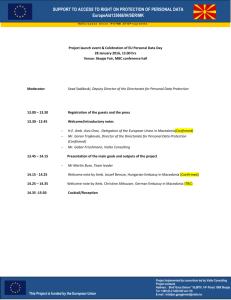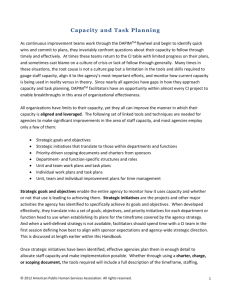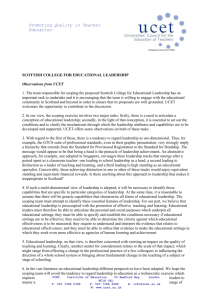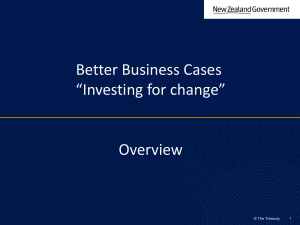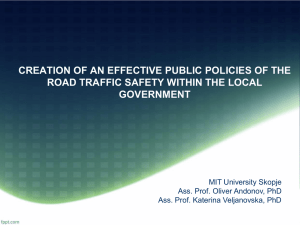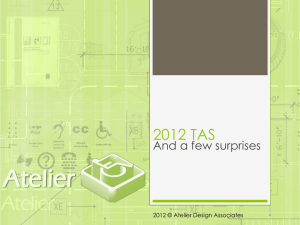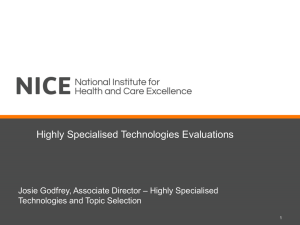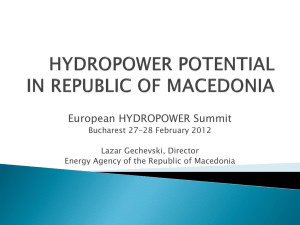Phase 3: Scoping Stakeholder Engagement
advertisement
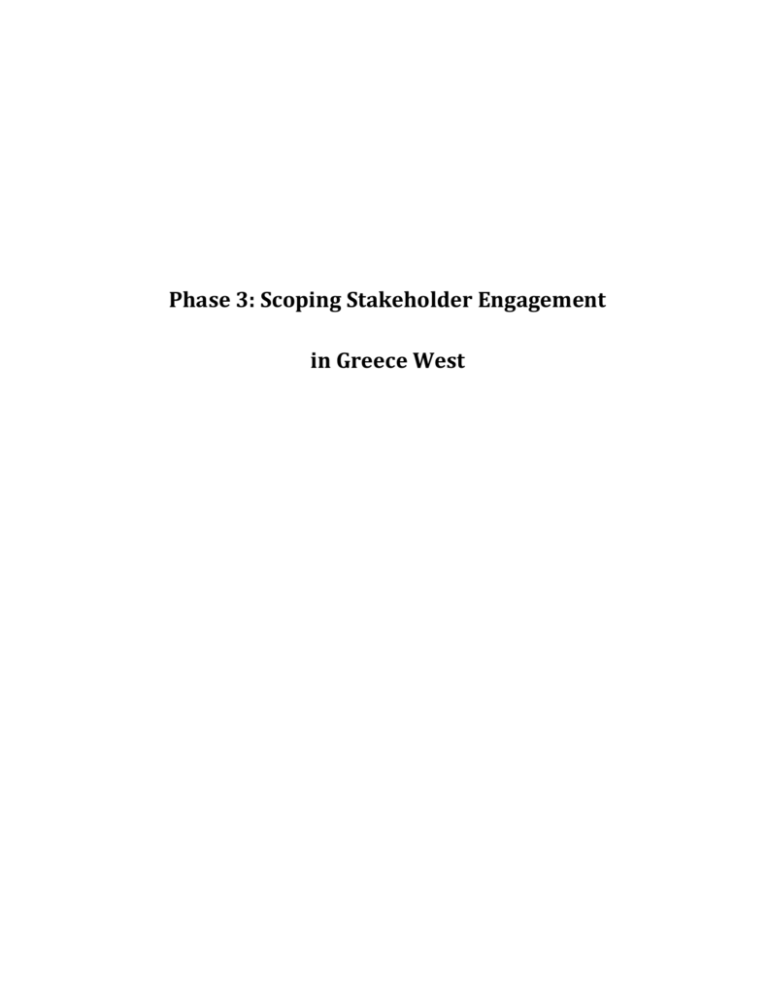
Phase 3: Scoping Stakeholder Engagement in Greece West 1 INTRODUCTION 2.1 This Report This report presents the stakeholder engagement undertaken as part of the scoping process for the Trans Adriatic Pipeline (TAP) Project in Greece. This report forms part of the overall Stakeholder Engagement Plan (SEP), which covers stakeholder engagement during all project development phases. ESIA scoping activities represent the third phase of stakeholder engagement for the project, following Pre-Scoping and Route Refinement engagement activities (see Table 1.1). The aim of this phase of engagement was to provide further detail regarding the Project to stakeholders and generate feedback on the scope, approach, key issues and other key stakeholders to be consulted during the ESIA phase. Phase Completed/ Planned Phase 1: Pre-scoping Completed Phase 2: Route Refinement Completed Phase 3: ESIA Scoping Completed Phase 4: Main ESIA Phase Planned Phase 5: ESIA Finalisation and Disclosure Planned Phase 6: Ongoing Engagement Planned Table 1.1: Phases of Stakeholder Engagement in Greece and Progress to Date Scoping disclosure and consultation was carried out in June-July 2011. It involved revisiting the government and NGO stakeholders previously engaged during the route selection process at a national, regional and municipal level along with representatives of communities of the 11 municipalities local crossed by the 2km corridor of the proposed pipeline route. In advance of the meetings, participants received copies of the scoping document. During the meetings project information discussion and questions. was presented and time was allowed for Local community representatives were asked to make the scoping report available at the local community level in advance of community meetings which will be held in the next phase of engagement (Main ESIA Phase). The mechanism for community members to provide views and comments in advance of community meetings was also explained. Information was also disseminated to local communities and to the general public via media advertisements. 2.2 Background and Steps Leading to the Scoping Process The scoping process was undertaken following completion of an alternatives assessment in early 2011. The alternatives assessment evaluated potential routes using technical, environmental, socioeconomic and cultural heritage criteria with the aim of identifying technically feasible pipeline route alternative with the least environmental, and cultural heritage impacts. the socioeconomic Once the preferred alternative had been identified and validated by key stakeholders, TAP produced a Scoping Report for the chosen base case route. Due to the compressed time-schedule in Greece and to avoid stakeholder fatigue, a separate route disclosure tour was not undertaken in addition to the scoping disclosure process. Instead, official letters were sent to all relevant stakeholders along the S0 route (the route not selected as the base case) informing them of the route alternative selection process results and the reasons why the N1 Alternative was selected by the Project. Key stakeholders along the new base case route were similarly informed of the route selection results in the letter introducing the scoping report. In addition, further discussion of the selected route was included in the scoping disclosure meetings that followed. 2.3 Objectives of Stakeholder Engagement During ESIA Scoping Disclosure The process of scoping allows key issues to be identified and addressed in the ESIA. It ensures that the ESIA phase is focused on the potentially significant environmental and social impacts which may arise from the Project. Scoping also takes into account the results of engagement undertaken to date for the Project, ultimately facilitating and defining the scope of work for the ESIA. The objective of engagement during the ESIA Scoping phase of the Project was therefore to provide further and more specific detail to stakeholders regarding the Project and to enable stakeholders to feedback on the scope, approach and key issues that should be further investigated in the ESIA. The activities carried out during scoping disclosure engagement focused on national, regional and local government authorities, NGOs and other interested parties at the national level. Information was also disseminated to local communities and to the general public via media sources and channels for their feedback were established via village heads. Appendix C contains the disclosure materials distributed in advance and utilised during scoping disclosure activities. 3 ESIA SCOPING DISCLOSURE PROCESS 3.1 Overview The ESIA Scoping Phase of engagement involved revisiting the stakeholders contacted during the route selection process at national, regional, municipal and local levels along the chosen route. Meetings were held separately in Athens with national government agencies, NGOs and other interested parties (universities, research organisations, etc.). Meetings were held with heads of regions on a face-to-face basis, as was the case in the earlier phases of engagement. Representatives from the 11 Municipalities and 39 local communities whose territory is crossed by the 2 km corridor of the pipeline were invited to attend one of three local scoping meetings along the pipeline route. Issues raised during meetings were recorded and are summarized herein. Stakeholders were also invited to submit follow -up questions and comments by post or through the Project website. 3.2 Summary of Stakeholder Meetings This section of the report describes the groups of stakeholders consulted during the ESIA scoping disclosure process. 3.2.1 National Level Stakeholders Meetings were held on 21 and 22 June in in Athens with national level institutions including Ministries, governmental agencies and regulators as presented in Table 3.1. Meeting date and No of venue attendees st 21 June 2011, 5 Participating Stakeholders • Athens Project Engineer, Ministry of Environment/ Special Service of Environment (EYPE) • Representative, Ministry of Environment (Directorate of Air Pollution & Noise) • Project Engineer, General Planning Directorate, Ministry of Environment • Forester Engineer, Forest Protection Division & Natural Environment • Project Forester, Ministry of Environment, Forest Protection st 21 June 2011, 1 Athens • Representative, Ministry of Environment, Fuel Policy (MEECC General Directorate of Energy) 22nd June 2011, 4 • Athens Prehistoric and Classical Antiquities Hellenic Ministry of Culture • Director, Prehistoric and Classical Antiquities Hellenic Ministry of Culture Table 3.1: • Archaeologist, Large Project Department • Archaeologist, Large Project Department Summary of National Level Meetings The Scoping Report was sent to ministry representatives with a letter inviting them to participate in a scoping meeting in Athens. The scoping disclosure meetings represented an opportunity to provide them with a project update and to identify key areas to address in the ESIA. 3.2.2 Engagement with NGOs and Other Interested Organisations The Scoping Report was sent to NGOs based in Athens (acting on a national and international level) with a letter inviting them to participate in a scoping meeting in Athens. In addition to NGOs, representatives from research organisations, universities and other relevant and interested organisations were sent the document and invited to attend. Meeting date Stakeholder Groups Invited No of and venue attendees Participants Stakeholder • Researcher, 23 June • WWF Greece 2011, Athens • Greenpeace Greece Hellenic Centre • Hellenic Ornithological Society of Marine • Hellenic Society for the Protection Research 3 of Environment and Cultural Heritage National • MEDITERRANEAN SOS Network Technical • Laboratory of Environmental University of Research of National Centre of Scientific Research ‘DEMOKRITOS” • National Polytechnic University • Aristotle University of Thessaloniki • University of Ioannina • Greek Biotope / Wetland Centre • Hellenic Centre for Marine Research - Institute of Inland Waters • National and Kapodistrian University of Athens Table 3.2: • Professor, Summary of NGO & Other Interested Parties Meeting Athens • Energy Campaigner, MED-SOS In addition to the Athens meeting, local and regional NGOs were invited to participate in the local scoping meetings held in Kastoria, Ptolemeida and Koufalia. Organisations invited included: • Callisto – environmental organisation for wildlife and nature; • Club of the Friends of the Environment Group (Kastoria); • ARCTUROS (Florina, Thessaloniki); and • Management Body of Axios Loudias Aliakmonas National Park. 3.2.3 Engagement with Regional Authorities sent the ESIA Scoping Report in Greek to the authorities with a covering letter inviting them to face to face meetings. Table 3.3 presents an overview of meetings held for scoping disclosure engagement. Meeting date and venue th 12 July 2011, Hotel Nikopolis Stakeholder Groups Attending No of attendees 12 Region of Central Macedonia (Thessaloniki) • General Directorate of Planning and Environmental Policy/Decentralized Administration of Macedonia Thraki, General Director • Department of Environment and Spatial Planning Central Macedonia/ Decentralized Administration of Macedonia Thraki, Director • Division of Water Central Macedonia/ Decentralized Administration of Macedonia Thraki, Director • Department of Environment and Spatial Planning Central Macedonia/ Decentralized Administration of Macedonia Thraki, Supervisor • Department of Environment and Spatial Planning Central Macedonia/ Decentralized Administration of Macedonia Thraki, Employee • Department of Environment and Spatial Planning Central Macedonia/ Decentralized Administration of Macedonia Thraki, Employee • Department of Environment and Spatial Planning Central Macedonia/ Decentralized Administration of Macedonia Thraki, Employee • Management Body of Axios Loudias Aliakmonas National Park, President • Management Body of Axios Loudias Aliakmonas National Park, Forester • General Directorate of Forestry & Rural Affairs/ Decentralized Administration of Macedonia Thraki, Employee • General Directorate of Forestry & Rural Affairs/ Decentralized Administration of Macedonia Thraki, Director • General Secretary of Decentralized Administration of Macedonia Thraki, Counsellor of General Secretary Meeting date and venue th 13 July 2011, Hotel Ermionio Table 3.3: 3.2.4 Stakeholder Groups Attending No of attendees 19 Region of West Macedonia (Kozani) • West Macedonia Region, Executive Secretary • West Macedonia Region, General Directorate • West Macedonia Region, Deputy Head of the Region • Environment and Urban Planning Directorate of Decentralized Administration of West Macedonia, Director • Environment and Urban Planning Directorate of Decentralized Administration of West Macedonia, Employee • Environment and Urban Planning Directorate of Decentralized Administration of West Macedonia, Employee • Elected Region of West Macedonia, Office of Head of the Region, Employee • Region of West Macedonia, Directorate of Technical Projects, Director • Deputy Head of the Region of West Macedonia • General Director of West Macedonia Region • Directorate of Environment and Urban Planning, Region of West Macedonia, Director • Region of West Macedonia, representative • Region of West Macedonia, representative • Hunting Federation of West Macedonia, representative • Technical Chamber of West Macedonia, Energy Team member • Technical Chamber of West Macedonia, Energy Team member • Technical Chamber of West Macedonia, Energy Team member • Directorate of Forest,Region of West Macedonia,Employee • Forestry of Kozani, Employee Summary of Regional Level Meetings Municipal and Local Authorities Municipal and local government stakeholders were invited together to participate in one of three local scoping meetings organised by TAP. In preparation for the meetings, TAP sent the Scoping Report to representatives from all 11 municipalities and 39 local communities crossed by the 2 km corridor, along with a covering letter inviting them to the scoping meeting in their respective regions. Table 3.4 presents an overview of meetings held for scoping disclosure engagement. Meeting date and venue 12th July 2011, Koufalia No of attendees Municipality 13 Skydra** 13th July 2011, Kastoria 17 Kastoria** Kalivia* Aspro Petrea Plevroma Rizo* Loutrochori Naousa* Polla Nera Edessa Agia Fotini Ano Grammatiko Kato Grammatiko Chalkidona** Nea Mesimbria Gefira Valtochori Parthenio Mikro Monastiri Pella** Agios Loukas Liparo Orestida** 14th July 5 2011, Ptolemaida Stakeholder Groups Invited Local Communities NGOs / Other Nestorio** Eordea** Amyntaio Kleisoura Verga Korrisos Dispilio * Poria Tsakoni Chiliodentro* Mesopotamia Oik.Pallinostounton Kalochori* Akontio Pteria* Kato Pteria Lithia Vasileiados* Militsa Ampelokipi* Agia Kiriaki Pentavrussos* Perdikas Galateia* Drosero Variko Antigonos • Life project in Kastoria, Project Manager • Arcturos, Director • Deputy Mayor of Ptolemeida * One representative present; ** Multiple representatives present; Table 3.4: Summary of Municipal and Local Authorities Meetings At the meetings, a presentation of the project and of the scoping report was made prior to opening the meeting to questions and comments. Participants were also able to submit follow-up questions and comments through comments sheets or subsequently send them by post or via the Project web site. 3.2.5 Engagement with Local Communities The main channel of communication with local communities was through local authorities. Heads of Local Communities participated in regional scoping meetings to represent their constituencies and disseminate information on the project and copies of the ESIA Scoping Document to individual stakeholders. In preparation for the meetings, TAP sent the ESIA Scoping Report in Greek to the heads of all local communities located within the 2km corridor along with a covering letter inviting them to the meetings. It was also requested that the report be made available at local community centres. In addition to the full report, a shorter leaflet with information about the ESIA Scoping Process was distributed to all Heads of Local Communities who attended the meetings. The participants were asked to place the leaflets in an accessible place in each settlement (i.e. communal premises, school building). In total, 39 Heads of Local Communities (HLCs) were invited to participate in the scoping consultation meetings and 10 HLCs attended. The level of interest and willingness to travel to a central meeting location, as well as other potential factors (e.g. the time of day and the voluntary nature of the position as compared to paid employees at the municipal level) contributed to the relatively poor attendance of local representatives. An extensive stakeholder engagement effort is planned at the settlement level in the ESIA phase, with open community meetings planned for every settlement along the base case route. 3.2.6 General Public Advertisements were placed in newspapers and on radio stations to help inform community members and other interested parties locally about the Project and the ESIA Scoping process and to provide information on the mechanism for providing comments. The Scoping Document was also placed on the Project website with an email address for submitting comments. 4 OUTCOMES OF ENGAGEMENT 4.1 Summary of Outcomes of Phase 3 Scoping Disclosure Engagement During scoping disclosure consultation, issues which were raised during the route selection phase were reiterated, especially those relating to land acquisition and compensation, economic development and employment. The impact of the Project on landowners and natural resources were also stressed as key concerns. The main comments raised during the meetings were the following: • Acceptance of the proposed Project: The Project has been widely accepted by stakeholders due to the expectation that it will bring economic growth and development to Greece and in particular due to the prospect of employment opportunities for communities along the route. • Support and participation of institutions in the ESIA: A number of representatives from government departments offered their support and expertise in providing baseline data on the status of the area and environment to facilitate any impact assessments or better inform the detailed route planning at a later stage. • Concerns regarding compensation: A key concern raised in all scoping meetings at the municipal and local level was how TAP will compensate landowners – currently, the land may be fields, pastures or uncultivated land but it has an intrinsic value due to the fact that the land can be developed at a later stage. • Concerns regarding land acquisition: Detailed questions on procedures for land acquisition, negotiations with landowners and “what if” scenarios were further key issues raised in all municipal meetings. The main concern was how TAP is going to acquire land if good faith negotiations fail and what will be the legal framework for such acquisitions, as it is a private project (ie not owned by the Government of Greece). • Concerns regarding water abstraction for hydro testing: Directorate of Water emphasized that quantities, sources, procedure and management of water to be used in the hydro testing of the pipeline should be defined. Additionally, the representatives of Axios- Loudias-Aliakmonas National Park Management Authority expressed their opinion that water abstraction should be from and to equal ecosystems. Timing of water abstraction is critical. • Concerns regarding natural resources and forests: Technical details and river crossings should be carefully Representatives from designed the to minimize Forest any damage to Directorate riparian vegetation. of Central Macedonia Decentralized Administration suggested that camping sites or pipe yards should be avoided in forested areas. TAP explained that this will be avoided. • Compatibility with other infrastructure: One participant asked if the presence of pipeline in a field is compatible with solar panels. A representative of the Technical Departments expressed his concern about potentially higher costs of developing underground pipe networks (e.g water pipes) in the future as they will have to be installed deeper underground due to the presence of the TAP Project. • Options for compressor stations and pollution: One participant in the Kastoria municipality meeting advised that TAP should consider installing the metering station close to Kastoria to raise employment opportunities during the project life time. Additionally, there was a concern expressed about potential air pollution from the compressor station located in Albania, and the trans-boundary impacts. • Employment opportunities for local communities during the construction period: In all municipal meetings, the issue of employment opportunities for local people during construction and details on how TAP is going to ensure that the contractor hires from local communities was key concern. • Other benefits in local communities: In Ptolemaida municipality the local perception is that PPC has not supported local communities and municipalities, despite its long lasting presence in the area. An idea was expressed that TAP could potentially sponsor some municipal activities and that the way of ensuring benefits to local communities should be clearly described and identified early in the project. • Regional Frameworks for Spatial Planning and Sustainable Development: During the meetings with the Regional authorities from both Central and West Macedonia, it was highlighted that Regional Frameworks are currently under revision by the Ministry. The authorities suggested following up with the Planning Directorate of the Ministry of Environment to define appropriate procedures and monitor any developments regarding regional planning. 5 EVALUATION OF ENGAGEMENT An evaluation of engagement was carried out at the end of Scoping Disclosure Engagement. A questionnaire was provided to the all attendees, including those at the national level meetings in Tirana, which included questions on whether the meetings were viewed to be: • free of manipulation, interference, coercion, and intimidation, and • conducted on the basis of timely, relevant, understandable and accessible information in a culturally appropriate format. In total, 53 participants out of 79 completed the evaluation questionnaire. The results of the evaluation suggest that the stakeholders were satisfied with the overall consultation maximum process and that the meetings number of participants were organised effectively allowing the to attend. Additionally, the great majority of stakeholders felt that the process was managed in way that was free of intimidation and not influenced by others to be supportive of the project. Nonetheless, the results show that participants feel they need more information in order to gauge the severity of the impacts of the Project on affected communities, especially in relation to land based livelihoods. As the development of the project is still at an early stage, the level of detail that can be provided to stakeholders regarding the TAP project is currently limited. It will however increase in due course with the progress of the activities in subsequent phases. TAP will continue to monitor and evaluate engagement activities throughout the project to maximise effectiveness.
